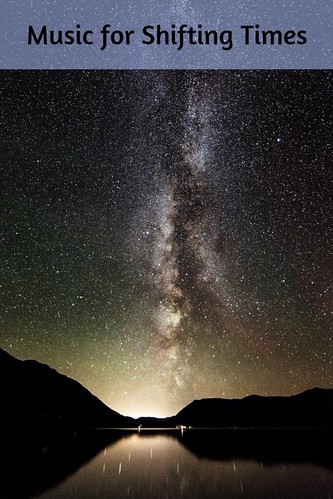Think of songs you may know: Where Have All the Flowers Gone, We Shall Overcome, The Coming of the Roads, Plane Wreck at Los Gatos. The first frames questions about war and sacrifice in terms both gentle and direct, the second is a gospel song adapted to civil rights and other causes, the third is a story about greed displacing people and landscape, the fourth a ballad which frames questions about identity and compassion in a news story about migrant farm workers.
Compassion: that is one thing which has allowed these songs to endure long past the specific moments which inspired their creation, and the events which people who first sang them knew about. When times are unsettling -- at any time, really -- anger and outrage only get you so far. Connection through story, story which allows anger, sorrow, and hope -- those are other things these songs hold in common. They all have vivid poetic language, and they ask, or invite hearers to ask, questions about what's going on.
That sort of work is going on in music amidst the uncertainties of today, as well.
Take a look at the work of three musicians who you will want to follow as these present times of uncertainty unfold. Bear in mind as you do that all of them write across a range of subjects: love songs, family-based songs, songs of landscape, and of history. Take time to explore their work.

Tim Grimm comes from Indiana farm country. His talents as an actor and musician have taken him to time living in Los Angeles and to travels across Europe. Some years ago, he decided to return to Indiana. From there, he's redefined his career, building success as a touring folk musician -- with a large following in Europe as well as in his home region of the American midwest -- and adding aspects, including writing scores for film and musicals, and hosting programs for broadcast.
The songs on his album A Stranger in This Time were written before, during, and after the US election cycle of 2016. Some touch on that directly. Many don't, yet all resonate with the seismic shifts going on. Grimm's home base of Indiana is very present in the music, especially in the song Thirteen Years, which tells a story of a tree and of his guitar, and in the almost mystical sense of place and season in These Rolling Hills. In Rolling Hills, Grimm evokes a sense of hard winter to come. That plays out in Gonna Be Great, a post-election consideration of what is and what may be coming. Not all is bleak, however. There are love songs, story songs, and the classic blues song Darlin Corry given a lyrical twist at the end by Grimm's son Jackson. Grimm's sons Connor and Jackson and wife Jan Lucas Grimm make up the family band which accompanies Grimm on this journey. They all know that serious points are sometimes best brought home with a light hand.
On her album Freedom Highway, Rhiannon Giddens offers a gathering of songs she has written and songs she's chosen which invite the reflection and asking good questions -- of oneself and of others -- which go along with times of uncertainty and change. What do we do about all this? The title character in the song Julie, a slave as the Civil War is ending, has her own answer to that. A different woman finds different questions but, perhaps, related answers in At the Purchaser's Option. Better Get It Right the First Time will ask hearers their own questions. Mysticism and history find their way in to When We Could Fly, and Baby Boy is a lullaby with its own assurance and it own questions.
Giddens grew up in the Piedmont of North Carolina. She studied opera at Oberlin, and was a founding member of the Grammy winning African American roots band Carolina Chocolate Drops. She's explored musical connections between southern roots and blues music and Irish music. All of that weaves into the background of Freedom Highway, which Giddens traveled to Louisiana to record with the assistance of producer Dirk Powell.
Karine Polwart comes from Scotland. In her music, she draws on traditional elements and speaks to contemporary concerns. Before she went full time into music, Polwart studied history, politics, and philosophy at university, and worked in a school setting as a philosophy tutor and later for an aid organization as a social worker.
Each of those things continues to provide sources for her songwriting. On her recording Traces, there is a song inspired by the Occupy London movement which draws in the architecture of Saint Paul's Cathedral. The murder of 11 year old Susan Maxwell is the subject of the song Half a Mile. Other songs take on aging, change, love, and The Grangemouth Refinery, among other subjects. Polwart's songs are not polemics or rants: rather they often make their subjects clear by poetic indirection in language. Another song on Traces has to do with the alteration of nature, landscape, and lives in Aberdeenshire in northeastern Scotland caused by the development of an executive golf resort by Trump International. The song is called Cover Your Eyes.
That song draws on history, community, landscape, and story in ways that suggest, at times, the calling on an ancient spell. It is a song which was written several years ago. Thinking about the political circumstances in the United States and their connections to Scotland, Polwart wrote another piece. I Burn But I Am Not Consumed also speaks of the natural world. At Celtic Connections in 2017, she performed it as prologue to Cover Your Eyes. The song is recorded on her album Laws of Motion. In the autumn of 2019, Karine and her brother Steven, who wrote the song with her, won the award for Best Original Song at the BBC Radio 2 Folk Awards.
Indeed, anger only gets you so far when living through change. The hardest questions are sometimes asked, and the best conversations had, through the work of artists.
Thank you for staying with us through this journey. Below, you'll find a link that will take you to an article which has a bit more backstory on the series. It also has links to a number of the stories, including ones called Listening for Community, Music for Winter's Changes, and The Geography of Hope.
Kerry Dexter is Music Editor at Wandering Educators.
You may find more of Kerry's work in National Geographic Traveler, Strings, Perceptive Travel, Journey to Scotland, Irish Fireside, and other places, as well as at her own site, Music Road. You can also read her work at Along the Music Road on Substack.
Note: This article was originally published in 2017 and updated in 2024.

